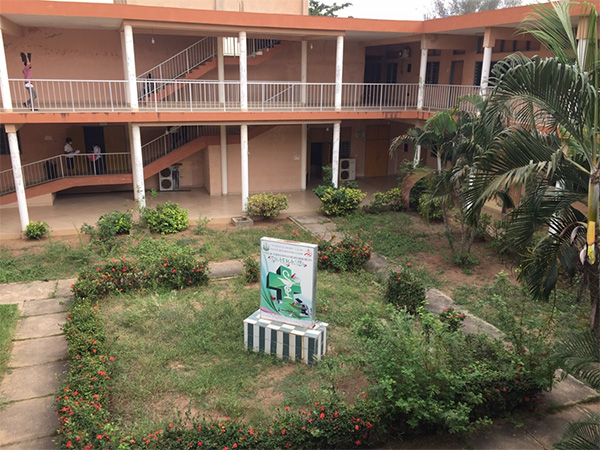Supporting the Faculty of Pharmacy in Benin
— Benin —

BACKGROUND
Following on from the work it carried out in Benin from 2002 to 2010 in support of the National Quality Control Agency (ANCQ), in 2021, the Fondation Pierre Fabre embarked on a 5-year project to assist the Faculty of Pharmacy in Cotonou. The goal: to consolidate the training options available to pharmacists and drug specialists, and create a regional network of experts capable of helping to combat counterfeit medicines.
A NATIONAL POLICY PROMOTING HIGH-QUALITY MEDICINES
As is the case in most medical fields, Benin has to cope with a shortage of pharmacists, with just nine pharmacists for 100,000 inhabitants in 2020. The country’s Chamber of Pharmacists had 651 listed members.
Despite this shortage, which is most acutely felt in public institutions and hospitals, Benin has led several initiatives to promote the control and quality of medicines during the past few years. In 2009, it was the driving force behind The Cotonou Declaration calling for an end to counterfeit medicines. The government recently set up an action plan encouraging the opening of pharmaceutical dispensaries in the country’s most hard-to-reach regions. Those commitments prompted the World Bank to fund a new building to host the ANCQ, on which work got underway in 2021.
BOOSTING THE RESOURCES OF THE FACULTY OF PHARMACY
The Fondation Pierre Fabre is committed to supporting the government of Benin by providing operational support for the Faculty of Pharmacy in the form of additional training resources (level of qualification and specialties) and by developing academic activities. The project also involves improving infrastructure as well as furnishing and equipping classrooms for practical exercises. Moreover, the Foundation provides assistance to help teaching staff identify other resources with the ultimate aim of making the structure financially independent.
At the beginning of January, courses for the first year of the “Quality Control – Quality Assurance of Medicines and Health Products” Masters began at the Faculty of Science and Health in Abomey-Calavi, Benin. This 1st intake comprises 15 students from Benin, the DRC and Togo, all of whom have initial training in pharmacy, engineering and chemistry. Find out more.
These advances will enable the faculty to train first-rate specialists who are able to meet Benin’s needs, while at the same time opening up career prospects for young graduates beyond pharmaceutical dispensaries to academic structures and public or private institutions (ANCQ, hospitals, biomedical analysis laboratories, pharmaceutical and agri-food industry). Professionalizing the sector is an effective way of supporting the progress of health programs in Benin.
MAKING THE FACULTY PART OF A REGIONAL NETWORK OF EXPERTS
The second part of the project involves facilitating interaction between the Faculty of Pharmacy in Cotonou and its neighbors in Sub-Saharan Africa, working to create a training network in the pharmaceutical sciences (WEAQUAM = West to East Africa Quality Medicines Network). The aim is to unite all professionals in the field of medicines so they can work together to promote the control and quality of medicines.
Initial interaction will focus on the Pharmacy program at the University of Lomé in Togo, to which the Foundation also provides operational support.
KEY FACTS
_____
Priority
Training healthcare professionals
Programme
2021-2025
Type of involvement
Distributor and operator
Actions
- Reinforce the faculty’s scientific, human and technical capacities.
- Help the faculty set up a network with neighboring institutions in Sub-Saharan Africa, so healthcare professionals can work together to promote the control and quality of medicines.

The Faculty of Pharmacy in Benin offers a very good level of training and works seamlessly with the Faculty of Medicine. It brings in foreign teachers from Belgium, France, Burkina Faso, Ivory Coast and Senegal, and has been strongly supported by the Belgian University Cooperation for 20 years, through the Universities of Brussels, Liège and Leuven. Together, these initiatives constitute a powerful springboard for building the future »
Françoise Nepveu
Scientific advisor to the Fondation Pierre Fabre.
REVIEW AND PROSPECTS
Achievements
Phase 1
Reinforcing the Faculty of Pharmacy (2021-2025)
- Boost resources and the specialties offered by teaching staff, by awarding training grants
- Building renovation
- Furnishing of two classrooms for practical exercises
Phase 2
Making the Faculty of Pharmacy part of a network (2022-2026)
- Installation of video conference rooms in partnership with the AUF (French-speaking academic agency)
- Support for the opening of a master’s degree in quality control and quality assurance of medicines and healthcare products.
- Support for the development of joint scientific research projects, including a project on making mobile quality control methods for medicines more widely available.
PARTNERS
- Agence Universitaire de la Francophonie (French-speaking academic agency)
- Pharmacy Program at the University of Lomé in Togo
- Faculties of Pharmacy in the WEAQUAM network
See Also
Support for the pharmaceutical curriculum at the University of Lomé
As Togo is striving to improve its pharmaceutical education, the Foundation has been involved in revamping local pharmaceutical training since 2011.
27/07/2018See Also
Rehabilitation of the Vientiane Faculty of Pharmacy
An initial partnership agreement was signed on 10 May 2005 and the Foundation embarked on the project with a threefold challenge before it: to fully satisfy the request, but, more importantly, to rally local youth around this renaissance and give the institution wings to fly on its own.
27/07/2018Follow our action
Mobile Clinics in the Central African Republic: Caring for Survivors of Violence
This unique initiative in the Central African Republic enables thousands of women to access crucial healthcare services and rebuild their lives.





